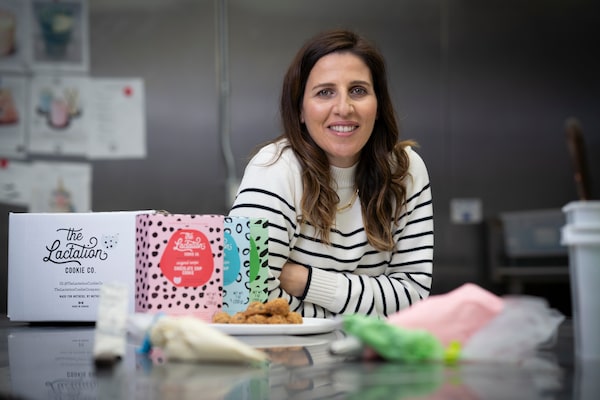
Lisa Sanguedolce, owner of Le Dolci Bakery & Culinary Classroom, pictured in Toronto on April 26 with a new line of cookies she’s producing.Peter Power/The Globe and Mail
Shortly after her son was born in 2018, Toronto bakery owner Lisa Sanguedolce drove across the Canada-U.S. border to buy lactation cookies at American retail giant Target.
She was unable to find a local Canadian supplier of the snack, which is made with ingredients such as oats and flaxseed that are believed to naturally promote the production of breast milk.
“You know, you’re sleep deprived and you really need these cookies,” Ms. Sanguedolce recalls with a laugh. “And I own a bakery!”
When the owner of Le Dolci Bakery & Culinary Classroom told her staff about the cross-border cookie jaunt, they offered to make her a few batches – a gesture that birthed another venture later that same year, The Lactation Cookie Company.
“I wanted to help others with their own breastfeeding journey by making these cookies more readily available,” she says. A portion of the cookie sales also goes to La Leche League, a global non-governmental organization that provides education and support around breastfeeding.
While there was a clear opportunity to get the product onto shelves in other markets, there were also challenges, including the pandemic putting her plans in limbo for two years.
Ms. Sanguedolce was inspired to export after participating in the Toronto Board of Trade’s Trade Accelerator Program, designed to help small and medium-sized businesses gain skills to access international markets.

The cookie Ms. Sanguedolce's company is producing contains ingredients such as oats and flaxseed that are believed to naturally promote the production of breast milk.Peter Power/the globe and mail
She credits the education, advice and mentorship she acquired through the program for giving her the confidence and know-how to get her product onto U.S. shelves.
“I’ve owned a bakery for more than 10 years and I’d never received any schooling like that, helping me grow things domestically,” she says. “I thought, ‘this is great, we’re going to get all kinds of assistance.’”
Ms. Sanguedolce and members of her team were able to attend trade shows and meet with nutritionists and other consultants, which she says really helped set them up for an international launch. The expectation was to be on U.S. store shelves last year, but the pandemic stalled the plans.
At the same time, her Toronto bakery was suffering from the lingering impacts of multiple lockdowns and shortages of ingredients due to supply chain disruptions.
The cookie company has been able to sell its products through its website for the past two years. By going the e-commerce route, it was able to test the products domestically and gather customer feedback without worrying about a storefront.
“We’ve had really positive customer feedback in that time,” Ms. Sanguedolce says. “People seemed to love the taste and love the look.”
The current plan is to team up with a large retailer in Texas (one she’s not ready to reveal) and be in up to 400 stores in the near future.
“We’re just super excited that this is something we get to export to the U.S.,” she says, adding this is merely the starting point for the company. Its long-term goal is to hit markets in the Britain, Germany and China.
Eric Janssen, a lecturer on entrepreneurship at the University of Western Ontario’s Ivey Business School, says a good strategy for exporting food companies is to “be a local everywhere,” meaning a business should tailor its product to a specific area and focus its marketing and distribution on that region.
“Don’t just say ‘we’re going to expand to Europe’ because Europe is a lot of countries and a lot of mini markets within those countries,” says Mr. Janssen, whose “Hustle and Grit” course specializes in teaching sales to entrepreneurs. “[It’s the] same with the U.S.; you want to be really narrowly focused. So instead of ‘let’s go to the U.S.,’ think ‘let’s go to New Jersey, let’s go to California.’”
He suggests creating a business plan for each market, gaining success, and then expanding from there.
Still, he cautions business owners about expanding beyond their capacity. For instance, a small business might jump at the chance to be on the shelves of Costco or Walmart, but if it doesn’t have the people or products to fill those orders, it could backfire.
“If they get into Walmart, but they can’t sell at Walmart, you don’t get invited back again,” Mr. Janssen says.
It’s been a few years and one global pandemic since Ms. Sanguedolce’s inspirational cookie quest. She’s optimistic her export business is ready to take off and she’s hopeful this new revenue stream will make up for the hardship still being felt by her Toronto-based bakery.
“Our co-packer is planning to turn on the machines in the next few weeks.”